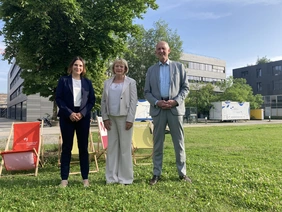The direction of travel is clear: to remain on course for success, THI is strengthening the important areas of continuing academic education as well as sustainability, transfer, and entrepreneurship with two female vice presidents. In addition, Equal Opportunities Officer Professor Michaela Regler will have the right to vote in the university management. Professor Hans-Joachim Hof will become Vice President for Teaching and Students and Professor Daniel Großmann will be responsible for all areas of research, including those for which the President was previously responsible. Professor Katherine Roegner is stepping down from the Executive Board at her request for health reasons. We would like to take this opportunity to thank her most sincerely for her commitment. The new Extended Executive Board will take up its work on the 1st of October 2024.
After studying law at the University of Regensburg, the new Vice President for Continuing Education, Professor Andrea Klug, focussed her research on patent law and intellectual property. After working as a public prosecutor, judge, head of department, and legal counsel, she was employed as a professor and in various functions in the university sector. She has been Head of the Campus for Continuing Education at THI since 2022.
Professor Elke Feifel, the new Vice President for Sustainability, Transfer, and Entrepreneurship, specialized in steel and lightweight construction after studying civil engineering and was a development engineer and project manager. She has been Professor of Machine Elements and Strength of Materials at THI since 2013 and was, among other things, head of the degree program and women's representative for the faculty.
The university's key topics by the "THI 2030" strategy are set out in the University Development Plan 2027 (HEP2027), which was signed on 29 November 2023. They document the expansion of the university to 8,500 students in the target agreement period and the expansion of teaching, research, and transfer in the areas of health, life sciences, and sustainable infrastructure as well as the intensification of research activities, particularly in the field of artificial intelligence (AI). Preparing students for an international and entrepreneurial economy and the challenges of digital and sustainable transformation are also part of this strategy. With the expansion and reorganization of the university management, the foundations have now been laid for the efficient and timely implementation of HEP2027.


![[Translate to English:] Logo Akkreditierungsrat: Systemakkreditiert](/fileadmin/_processed_/2/8/csm_AR-Siegel_Systemakkreditierung_bc4ea3377d.webp)








![[Translate to English:] Logo IHK Ausbildungsbetrieb 2023](/fileadmin/_processed_/6/0/csm_IHK_Ausbildungsbetrieb_digital_2023_6850f47537.webp)


